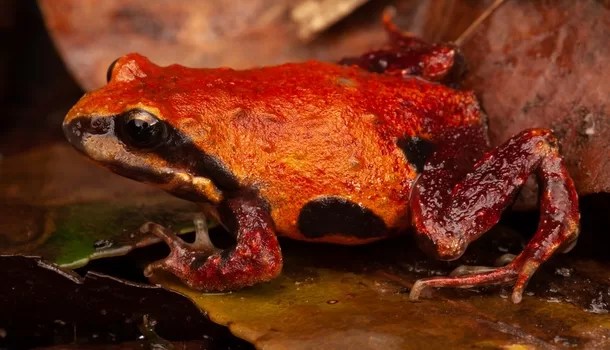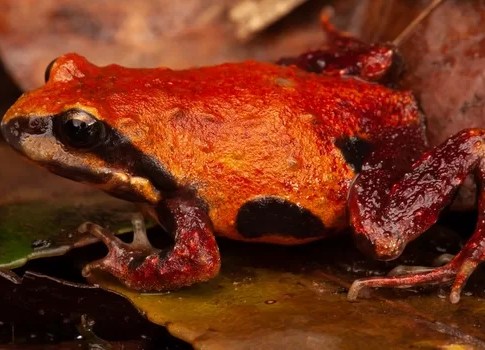Pugh’s Frog (Philoria pughi), a rare and ancient amphibian species native to New South Wales, has recently been uplisted to “Endangered to Extinction” on the national conservation list. The move comes as a response to increasing threats to the species’ habitat, particularly from logging activities, which have prompted urgent calls for protective action from environmental groups.
The frog’s survival is intricately linked to the unique environment of the Gibraltar Range and Timbarra Plateau, where it digs nests in the soaks and seepages found at the headwaters of streams. Pugh’s Frog leads a largely sedentary life, rarely venturing more than a hundred meters from its nesting site.
The North East Forest Alliance (NEFA) spokesperson Dailan Pugh highlighted the deep evolutionary history of the Philoria genus, which traces its roots back over 50 million years to the ancient supercontinent Gondwana.
“A few million years ago, these frogs became increasingly isolated on mountain tops, where they evolved into distinct species,” Pugh explained.
The impact of climate change has forced these species to retreat to higher altitudes, where the devastating droughts and fires of 2019 have taken a severe toll. Pugh’s Frog was among the worst affected, with 85% of its habitat burned, leading to the loss of some populations and reducing others to just one or two calling males.
Advertisement:
Dailan Pugh shared a personal connection to the species, revealing that Pugh’s Frog was named in his honor in 2004, in recognition of his efforts to protect its habitat.
“After millions of years of existence, Pugh’s Frog has now been identified at risk of extinction within 50 years. Unless urgent action is taken, my namesake could be extinct in my children’s lifetimes,” he warned.
The North East Forest Alliance (NEFA) has been at the forefront of the advocacy efforts, urging the NSW and Commonwealth Environment Ministers to revise logging regulations to safeguard the frog’s delicate habitat.
Logging activities in the frog’s habitat are currently underway in the Gibraltar Range and Ewingar State Forests. The logging is being conducted under outdated rules that were established 27 years ago, which NEFA argues are grossly inadequate given the increased logging intensity and reduced protections for streams.
The NSW Threatened Species Scientific Committee has also raised concerns, stating that “timber harvesting directly impacts the species habitat and affects ecological and biological processes; and could lead to both direct and indirect impacts on Philoria pughi.”

According to Pugh, logging poses several direct threats to the species, including the potential killing of individual frogs and the drying out of their vital soaks and seepages.
The opening of the forest canopy and the subsequent growth of thirsty regrowth also increase the risk of fire, further endangering the species’ already precarious existence.
Given the dire situation, Pugh has called on Federal Environment Minister Tanya Plibersek and NSW Environment Minister Penny Sharpe to take immediate action.
“As they are responsible for approving the logging rules, it would be negligent for the Federal Environment Minister and the NSW Environment Minister not to improve protection for Pugh’s Frog in response to its uplisting to nationally Endangered,” he stated.
He emphasized that the survival of Pugh’s Frog hinges on protecting its moist refuges, stressing that logging must be excluded from the catchments above their nesting areas to prevent the species’ extinction.
The fate of Pugh’s Frog now rests in the hands of those in power, and the environmental community is watching closely to see if the necessary steps will be taken to ensure the species’ survival for future generations.
The Pugh’s Frog was one of eight animals and five plants added to Australia’s threatened species list in the past month, see full story here.
Pugh’s Frog

Pugh’s Frog, scientifically known as Philoria pughi, is a small, rare frog species found in New South Wales, Australia.
It is part of the family Limnodynastidae and is known for its limited distribution, primarily in the high-altitude regions of the Gondwana Rainforests, such as the Barrington Tops and Mount Royal National Park.
This frog is distinguished by its relatively small size, usually around 30 to 40 millimeters in length. It has a brownish to olive-green back with scattered dark spots, and its underparts are typically a pale color.
Pugh’s Frog is a terrestrial species, often found in moist, mossy habitats near streams and seepages in cool, forested environments.
The species is considered vulnerable due to its restricted range and specific habitat requirements, making it sensitive to environmental changes.
Threats to Pugh’s Frog include habitat destruction, climate change, and the potential spread of diseases like chytridiomycosis, which has affected many amphibian populations worldwide. Conservation efforts are crucial to protect this species and its habitat.
Related stories
8 animals & 5 plants added to Threatened Species this month
Port Macquarie Koala Hospital well worth a visit!
NSW Rural Fire Service Aircraft Fleet
RFS Firefighters Unite North America and Australasia
Integrating Indigenous Knowledge into Bushfire Management
Mistake State Forest: A Battle for Preservation
Targeted Logging Threatens Great Koala National Park
Replacing timber power poles saves our forests
People’s Court Finds Tasmania Politicians and Loggers Guilty
Murray Darling Basin Water Markets Lose $2 Billion
Advertisement:
Comments are open:




